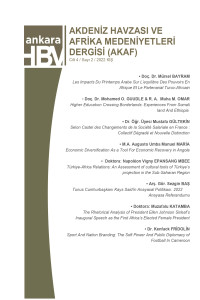Abstract
There is a growing realization of the crucial role cross-border tertiary education may play in strengthening national capability and promoting intercultural understanding and Economic Development. Somaliland was struggling to rebuild its infrastructure after years of civil war with Somalia, it opened its first university in 1998 and has been steadily expanding its higher education system since then. While significant challenges remain, higher education is thriving as thousands of high school graduates place their hopes in the country's universities and colleges each year. Cross-border higher education (CBHE) then is becoming more and more prominent in many countries' border strategies, although this does not seem to have increased the connection between the communities of education and trade policymakers. This lack of engagement leads to numerous missed opportunities to leverage trade and economic development resources to enhance international education endeavors and vice versa. Unquestionably, there is an increasing interest in cross-border tertiary education for a variety of reasons. These variables include modifications to student mobility, program mobility, the provision of long-distance education, and the general trend of rising student enrollments(Chetro-Szivos, 2010). Cross-border tertiary education is becoming more popular, but the reasons go beyond shifting student demographics and innovative delivery strategies. Many academics contend that the intellectual development of a nation's people can influence social and economic progress within that nation. Using a mixed methods approach, this paper critically explores Cross- Border Higher Education and the local economic development, using in-depth interviews, oral data, and reports from government institutions, research centers, and educational establishments in Somaliland and Ethiopia, the experiences from Somaliland were elaborated deeply.
References
- Affi, L. (2012). Destroying and Constructing the State from Below: The Role of the Somali Diaspora in Conflict, Development and Governance. In ProQuest Dissertations and Theses.
- Bradbury, M., Abokor, A. Y., & Yusuf, H. A. (2003). Somaliland: Choosing politics over violence. Review of African Political Economy, 30(97), 455–478. https://doi.org/10.1080/03056244.2003.9659778
Abstract
Sınır ötesi yükseköğretimin ulusal kapasiteyi güçlendirmede ve kültürlerarası anlayışı ve Ekonomik Kalkınmayı teşvik etmede oynayabileceği önemli rolün giderek daha fazla farkına varılmaktadır. Somaliland, Somali ile yıllar süren iç savaştan sonra altyapısını yeniden inşa etmek için mücadele ediyordu, ilk üniversitesini 1998'de açtı ve o zamandan beri yükseköğretim sistemini istikrarlı bir şekilde genişletiyor. Önemli zorluklar devam etse de, binlerce lise mezunu her yıl ülkenin üniversitelerine ve kolejlerine umut bağladıkça yüksek öğretim gelişiyor. Sınır ötesi yüksek öğretim (CBHE), o zaman birçok ülkenin sınır stratejilerinde giderek daha fazla öne çıkıyor, ancak bu, eğitim toplulukları ve ticaret politika yapıcıları arasındaki bağlantıyı artırmamış gibi görünüyor. Bu katılım eksikliği, uluslararası eğitim çabalarını geliştirmek için ticari ve ekonomik kalkınma kaynaklarından yararlanmak için çok sayıda kaçırılmış fırsata yol açar ve bunun tersi de geçerlidir. Kuşkusuz, çeşitli nedenlerle sınır ötesi yükseköğretime artan bir ilgi vardır. Bu değişkenler, öğrenci hareketliliğindeki değişiklikleri, program hareketliliğini, uzun mesafeli eğitimin sağlanmasını ve artan öğrenci kayıtlarının genel eğilimini içerir (Chetro-Szivos, 2010). Sınır ötesi yükseköğretim daha popüler hale geliyor, ancak bunun nedenleri öğrenci demografisini ve yenilikçi dağıtım stratejilerini değiştirmenin ötesine geçiyor. Pek çok akademisyen, bir ulusun halkının entelektüel gelişiminin o ulustaki sosyal ve ekonomik ilerlemeyi etkileyebileceğini iddia ediyor. Karma yöntem yaklaşımını kullanan bu makale, Somaliland ve Etiyopya'daki devlet kurumları, araştırma merkezleri ve eğitim kurumlarından gelen derinlemesine görüşmeler, sözlü veriler ve raporlar kullanarak Sınır Ötesi Yüksek Öğrenimi ve yerel ekonomik kalkınmayı eleştirel bir şekilde araştırıyor. Somaliland derin bir şekilde detaylandırdı.
References
- Affi, L. (2012). Destroying and Constructing the State from Below: The Role of the Somali Diaspora in Conflict, Development and Governance. In ProQuest Dissertations and Theses.
- Bradbury, M., Abokor, A. Y., & Yusuf, H. A. (2003). Somaliland: Choosing politics over violence. Review of African Political Economy, 30(97), 455–478. https://doi.org/10.1080/03056244.2003.9659778
Details
| Primary Language | English |
|---|---|
| Journal Section | Research Articles |
| Authors | |
| Early Pub Date | December 31, 2022 |
| Publication Date | December 31, 2022 |
| Published in Issue | Year 2022 Volume: 4 Issue: 2 |
Our journal publishes academic studies covering a broad spectrum of topics related to the Mediterranean Basin and Africa, including history, culture, politics, economics, literature, sociology, and international relations. Academics, researchers, and specialists wishing to publish their original research in these fields are invited to submit their manuscripts.
The manuscript evaluation process is conducted under the principles of scientific research ethics and follows a blind peer review system. Articles submitted for publication must be prepared in accordance with the journal’s author guidelines.

